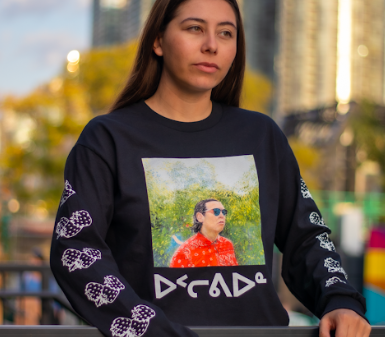On this week’s episode of Let’s Talk About…, Elise sits down with co-host Sarah Joseph to talk about relationship red flags.
Sarah is a certified emotional intelligence coach whose mission is to help you get comfortable with your emotions and master them to live a more purposeful life. She understands how our lack of emotional management can impact the longevity of our relationships and can inspire our emotional healing by plugging into our most powerful tool, the Mind. Her philosophy is that our emotions show up in every aspect of our lives and it’s your right to learn how to manage them effectively to your advantage.
On this week’s episode, Elise and Sarah talk about identifying red flags, common reasons behind red flags, and how to know when to walk away or work on them.
“We also need to go into do is accept where our insecurities and these bad feelings come from so that we don’t get walked all over.” Sarah tells Elise on Let’s Talk About.
Check out our show’s full transcript below.
[00:00:00] Elise: Hi everyone, and welcome. This week we’re talking all about red flags and relationships with emotional intelligence coach Sarah Joseph. Hi, Sarah.
[00:00:13] Sarah: Hello, how are you?
[00:00:15] Elise: Good. Excited to be continuing our series here and I think a topic that probably most people, whether they’re looking for a relationship in an early dating stage in a, you know, a few years into a relationship getting into marriage, and maybe even I, I think even beyond that now, we’ll find interesting.
Um, and so. I love what you put together here. So what we’re gonna giving everyone just a little bit of an overview of today, we’re gonna go through, it’s on a completely exhaustive list, right Sarah, but like a pretty thorough list of what Sarah has seen in her work as relationship red flags. Um, and we also want to preface this a bit in that some of it might not be a red flag to some someone, and maybe Sarah, you could talk a little bit about that before we even get into it.
[00:01:14] Sarah: Yeah, for sure. And I think as I was actually going through the list, I put in some really obvious, you know, red flags that were obvious to me. And then I went, wait, but this night act might not actually be obvious to everyone listening, because everyone’s version of a red flag is different, right? Mm-hmm.
But at the same time, there’s so many repetitive behaviors that some of us take on and we notice in our relationships that we actually do nothing about. And we know that, you know, these feelings are still alive and well in the relationship. And if they’re alive in you, then they’re alive in the relationship.
And we kind of sometimes kind of bypass a little bit of what’s really happening in front of us and we go, oh, that’s not really a red flag, because I’m used to it. Right? And that’s kind of where we built this tolerance for a high tolerance for inappropriate behavior. And I can get into that, right? Um, but.
just a disclaimer that just because you notice some of these red flags in your relationship, it doesn’t mean that you need to break up, right, ? Yeah. It doesn’t mean that we need to end the relationship right now, my God is a red flag, right? If anything, we all actually need to experience some red flags in our relationship so that we can, you know, heal and grow and evolve as people, as people that are loving each other and then individually within our families, right?
So be mindful that red flags are actually kind of a good thing, but know when it’s too much and then when you do need to leave and know your threshold, know how much you can tolerate, and at the same time know where this is a boundary or somewhere where you need to place a boundary with yourself. Or if this is in an area where you can learn and you can grow together.
Yeah, so there’s definitely, definitely different areas where you can take all of these red flags, but these are just some generic ones and things that I’ve noticed either in my own relationship and just, uh, counseling with other people as well. Mm-hmm. .
[00:02:58] Elise: Well, and I think it’s important you, you mentioned that what you just said is like, if two people are willing to work on these red flags and there might be some that are more work honorable.
Mm-hmm. like a lack of communication than maybe like physical abuse. Yeah. Then, then there is, you know, to your point there, that’s something that you can work on in the relationship. I think in, in my experience anyway, not necessarily being an expert in this, but it’s like when the other party isn’t willing to work on any of their behavior mm-hmm.
and you are not willing to work on any of your behavior, then where do you probably, where you’re kinda at a standstill. Right? Like if no one’s willing to evolve as a person, and maybe that’s, honestly, maybe that’s a relationship green flag is when you do find someone who’s willing to like work on themselves better themselves.
Mm-hmm. better your relationship. Maybe, maybe in another episode we can do relationship green flags, . I think
[00:03:54] Sarah: that would be great actually. Yeah. Cause I, I came across that idea and I was like, you know, some of these actually lead into green flags, which is great. Mm-hmm. . Um, but I think starting with the red flags is good for a lot of people to know what they should be aware of in their relationships.
Mm-hmm. and why mm-hmm. .
[00:04:11] Elise: There’s a podcast that I love that’s about relationships specifically. Um, dating and relationships. It’s called you up and it’s like a comedian in, Jared Fried and Jordanna Abraham, who’s from Bees Media.
And they have this segment on the podcast that’s called Red Flag or Deal Breaker. Um, and it’s kind of interesting cuz they ki talk about the nuances of. , I guess it’s a little different than this, but they kind of talk about the gray area of some of these things. And again, some of them might have, some of these lists that we’re gonna go through might have a gray area, others probably don’t.
Um, but it’s k it, it is worth saying that, you know, depends on the context of your relationship, maybe to some extent as well, or maybe the time of your relationship, like I noticed, um, an inconsistent behavior and we’ll, we’ll go through line by line, but inconsistent behavior is one of the red flags you have listed.
So they’re hot and cold. Mm-hmm. . And I think that that’s at the start of a dating relationship, probably kind of common, right? So maybe not as much of a red flag at the start of a relationship. Um, but let’s get into it. Let’s go through it. So the first one you, we have here is excessive jealous.
[00:05:20] Sarah: Ooh, that, that’s a great one.
excessive jealousy. So normally in the beginning, we don’t often always see excessive jealousy or jealousy right on at the onset, right? That’s usually behavior that comes after. But for some people it might be the case where it does happen at its onset, but let’s say you’re in a relationship for a longer period of time, and then you start to notice jealousy.
So it might appear as them not allowing you to hang out with your friends, them not wanting you to hang out with even family, sometimes them not wanting you to even, you know, be in relationships with the same or opposite sex, right? Um, jealousy can even show up as a way to control, manipulate, or dominate, um, the other person, right?
So usually when jealousy comes up, A way to say, a way to say it better would be angry admiration. And w jealousy doesn’t appear as admiration right away. In fact, it’s masked by all the painful feelings. So really what this other person, you know, might be feeling is that I’m actually, I actually wish that I could, you know, do what you do or have friends, the way you have friends or have relationships, the way you have relationships.
But it’s mass with a lot of painful feelings like anger and helplessness and sadness and rejection, that it becomes difficult to actually as access that admiration and be able to use it in the relationship. So that definitely takes some work, but jealousy in a relationship is a big one, and it stems from a lot of, uh, control and anger.
[00:06:55] Elise: Mm-hmm. Interesting. For that one I’ve never, never really experienced excessive jealousy on my side or, cuz I guess these could be our own relationship. Red flags too, right?
Like there’s one I actually think is probably my relation, my own doing red flag. The only thing I would say is I think sometimes getting into a relationship, I don’t know, this doesn’t really necessarily have to do with excessive jealousy, but you know, you mentioned the hanging out with friends, hanging out with family, like you, there is a, there is that merging of your lives, right?
And so that’s probably the time I’m guessing that you would see the success of jealousy more. For sure.
[00:07:34] Sarah: For sure. Yeah. Okay. Yeah, it could definitely come up there. Um, a little more. There’s also, I’ve never really personally. Experienced excessive jealousy, but I’ve experienced excessive dominance that stems from jealousy.
Mm-hmm. . So, um, I know we were talking in our last podcast about masculine and feminine energy, and at that time I, in the specific relationship, I was really heavily dominant in my masculine energy. And then being with another male that also wants to be heavily dominant in their masculine energy dating me was an attack to their dominance.
Right. It was an attack on their masculinity. And what I found, found came up a lot was jealousy between how much money we made. Right. So maybe who made more, who made less, and this specific person, you know, had the mindset that a man should make more than a woman. Right. And of course, I was not comfortable with that, but having, being.
coming from the childhood that I came from, I have a really high tolerance for inappropriate behavior. So I let a lot of things slide at that time. And you know, you’re young and you’re kind of like, okay, maybe, maybe this is okay. Like he’ll get over it eventually, but they actually don’t go get over it at all.
Right? If fuels more of the hatred in the relationship. So a lot of resentment came out of that relationship and a lot of excessive jealousy and dominance came out of that relationship. And it was kind of even to the point of who walked in front of who, right? Or like if you took a step further than he did, then it, it was like you were getting yourself into an argument.
So there are people out there that do, you know, really do see this to be their truth, right? That dominance or that masculinity. And if you threaten that, then they can become easily jealous or threatened by you.
[00:09:16] Elise: You mentioned tolerance too, to some of these things like your own environment and how you grew up, like major tolerance to that higher.
I guess, right. And so that’s really interesting too, because I think it probably, it took me some time to get into a longer term relationship because my tolerance was not there for a lot of things.
[00:09:40] Sarah: Which is a good thing
[00:09:42] Elise: which is maybe, which is well, like just maybe not even all red flags, but my tolerance wasn’t there for a lot of things.
And so that also the pendulum can swing the other way too, right? Where like, yeah.
[00:09:53] Sarah: So that’s definitely finding your balance with that, right? Yeah. So when I mention, having a high tolerance for inappropriate behavior, essentially if you think about it, maybe you can go back to your childhood or things that have happened to you in the past, and if they were really detrimental things over time, you’ve learned to kind of bypass them. You’ve gained a tolerance to really be okay with what’s not okay. And unfortunately, when we get into relationships, what happens is we allow people to treat us in a way that we’re really not okay with, but we become okay with it because we were taught to be okay with it.
We were conditioned to be okay with it. So that happened for me for a long period of time, and only until like really healing and going through my emotional journey did I find that learning when my emotional tolerance was being spiked, or my tolerance for inappropriate behavior was being spiked and actually dialing it back and taking it slow and going, is this an area where I’m abandoning myself or allowing somebody to mistreat me?
Right. And then because I, I what didn’t have the tolerance to understand that for myself because of how high my tolerance was, I would put myself in the average person’s shoes. Right. And I’d say, would the average person be okay with somebody checking their phone constantly? And I went, no, I don’t think so.
Right. I think that would make somebody, you know, Feel upset or disrespected, or not trusted or rejected, but I’m letting this behavior slide. And even though there is a part of me that, you know, feels this isn’t okay, there’s also a part of me that’s going, uh, well, I’ve dealt with worse, right? So then we let a lot of things slide and it builds up in the relationship.
So notice when you have a high tolerance for inappropriate behavior in your relationship and notice how you really actually feel about it. And then if you can’t make that distinction, put yourself in someone else’s shoes, the average person, and notice that if someone else that hadn’t gone through what I went through was experiencing this specific situation, how would they take it?
How would they feel? And you might be able to shift your perspective that way. Hmm.
[00:11:57] Elise: Interesting. No, I like that. Um, the next one we have listed here is gaslighting and manipulating you. So I think the manipulating part is probably straightforward, but for those, I feel like gaslighting has become this very big buzzword.
Can you maybe explain it for those that don’t have a clear definition on it? .
[00:12:15] Sarah: Yeah. So the best way that I like to explain it to clients is basically making you believe that what you’re seeing, feeling thinking is not actually true, right? And this could show up as saying things like, you’re crazy, you’re delusional.
Um, there’s no way I would do that, but in fact, that could actually be what’s happening. So a lot of the time when gaslighting is happening, we’re also feeling a lot of opposite emotions that are telling us. There is absolutely no way that my intuition is. Usually your intuition is going off when you’re making an assumption that someone’s gaslighting you.
Right? We always don’t know when we’re being gaslighted, right? Until, you know, we get the information and we’re more informed and we’re going, whoa. But usually your body is giving you indicators and communicating to you when you are being gaslighted or when you are being manipulated, for example, right?
So you may feel uncomfortable, right? You might feel a little fluttering in your stomach, right? You might feel your intuition kind of pull you back and go, huh, that that doesn’t make sense. Or you might require or ask more information because it kind of sounds confusing. So, Notice your social cues in terms of what your body is communicating to you.
And that can really help you with understanding whether or not you’re being manipulated or gaslighted. But for a large part of us, being in tune with those feelings takes time. Right? And again, high tolerance for inappropriate behavior. We might let a lot of things slide that we’re just unaware of, and that’s not your fault, right?
Mm-hmm. .
[00:13:41] Elise: Hmm. Um, the next one is, I think one of the things I have to work on, . Um, they don’t take time to listen to you. So I know I’m not the greatest listener. Even sometimes in this podcast, I’m like, zip it, Elise . So I know that, that that’s something like an active listening is something that I am aware of in myself and working on.
Um, and I do think I’ve actually made progress there, so Pat on back to me. But it’s something like, I always just, I think when I get excited and. , I, I talk, and I also think I never liked silence growing up, and so I fill the space right, of talking versus like listening. So I’ve been working more on my listening skills.
So I don’t know if you have anything to add to that, but I’ll point out one of my own, uh, weaknesses there. . I love that.
[00:14:29] Sarah: No, and I love that you’re really aware of that, right? And I think that’s the biggest part when we’re not aware of the fact that we aren’t good listeners or aren’t good communicators, for example, and then we go into these relationships and then kind of get confused why it’s not working right.
And then it kind of is an attack on our ego when we have to, you know, learn how to be better listeners and better communicators. And it’s like, oh, what’s wrong with me? Right? So I actually completely understand what you’re saying because for a long period of time I wasn’t a good listener either. Right? I was also very excited about the things that I, you know, experience or go through.
And I love to talk, and it’s kind of been my career now, but something that I’ve learned through coaching and coaching clients is that. , A lot of clients want to be heard, right? And a lot of clients want the space to be heard. And that is kind of how you can help solve so many solutions, is just giving someone the space to express what they feel and how they feel without judgment, without criticism, or without commentary, right?
Some people just need a shoulder to, to cry on or somebody to hear them out. And after I learned that, I went, okay, so how do I learn to zip it as well? . And for me it was a simple practice that I started doing, um, with my feet. So , what I would do is I would ground my feet into the floor beneath me and kind of imagine like a string pulling me down into the Earth’s core.
And the reason that we kind of sometimes overtalk, or the reason that, you know, it becomes a hard place for us to listen is because our thoughts are everywhere. Like they’re just going everywhere. We have a million thoughts per per second. We’re just processing so many things at the same time, and we wanna get it all out before we forget.
So what I find is a grounding myself kind of into the Earth’s core as I’m listening to you, helps me to be there for you. And it kind of helps me to calm down so that I can process my own thinking because not every thought that comes to mind needs to be said, right? And maybe it’s the thought that.
Really can help the person that comes maybe 20 thoughts later, right. Without having to say all 20. Right. So not being able to listen in a relationship can be really difficult because the other person doesn’t feel heard. Right. They don’t feel, and they’ll, they’ll end up feeling really rejected, really vulnerable, really helpless.
They might even feel, um, really exhausted in the relationship for not being able to express how they feel and they might feel really under misunderstood. Right. So listening and active, active listening is how we can help, um, more of our relationships feel more understood, heard, and seen in the relationship.
[00:17:16] Elise: Hmm. Ok. I love that. The next one is pretty straightforward. I don’t know if, if you wanna add something to it, you can, but verbal and physical abuse, um, yeah, I think that kind of is. Uh, obvious. Um, the next one Yeah. Of
[00:17:31] Sarah: verbal, sorry, go ahead. Physical abuse. Yeah. Any type of verbal or pH Physical abuse is a big no-no in a relationship.
Right. If there’s anybody, um, if there’s anyone touching you or saying things to you that makes you uncomfortable, setting that boundary is really important. Or letting the relationship go is also very important to not only your safety, but your health, right. And the future of your relationships moving forward.
But there are some of us that have come from backgrounds where we’ve been severely verbally and physically abused. Right? So getting into a relationship, it’s almost strange to not have that, right? So they may again have a high tolerance for inappropriate behavior, and they may allow it to happen to them again.
Right? So that’s why I don’t wanna say that it is obvious, right? Because for some people it’s not Right. That’s true. Yep. But in most cases, yes, verbal and physical abuse is not okay. .
[00:18:21] Elise: Mm-hmm. . Uh, next we have, they seek constant control over you. I’m guessing the sound, this one sounds like it’s a little tied to that jealousy piece that we talked about earlier.
[00:18:32] Sarah: Yeah, it’s definitely ties as a jealousy and definitely tied to the gaslighting and manipulation. Seeking constant control definitely comes from insecurity, right? So it comes from the insecurity of not knowing. It comes from the insecurity of, from their past relationships of how they were treated, right?
So many of us may have been cheated on in the past, and then we kind of take those wounds with us into new relationships, and then we kind of. Project them onto other people when that might actually necessarily not be the case, except we haven’t taken the time to heal those wounds and to go into really understand where this is coming from.
So definitely looking at where you’re seeking control and why, and then going into validate that, that makes a lot of sense, but that this person isn’t the person you’ve dated in the past. Right? And look for reasons for why they do love you, that they are showing up and that they don’t deserve to be treated the way that they are being
[00:19:27] Elise: treated.
Uh, the next one I mentioned, uh, earlier, that inconsistent behavior. So they’re hot and cold, and I think this is like such an. Um, uh, natural one or one that happens often in early stages of dating, especially how we’re dating nowadays, like on apps and through text and maybe a message one day someone’s love bombing someone and the next day they’re going cold and ghosting or the, all these kind of buzz dating terms that we’ve used.
So I can imagine early on in the datings process, this is probably fairly common because the likelihood that you may be met on an app, this person isn’t. doesn’t know a lot about you, so you can’t expect them to be that involved in the scenario, and so they might appear hot and cold. Right. Um, mm-hmm. , I, I guess here we’re talking about more into a relationship.
Mm-hmm. not necessarily like at the getting to know you part. Is that fair to say? Or maybe
[00:20:23] Sarah: I’m wrong. Yeah, I would say that, I would say the high school does definitely make sense in the beginning. Right. But if someone is truly interested in you, they’ll make the time, right? Yeah. And so maybe you’re giving it after.
oh, sorry. Go ahead. Yeah, in the relationship, right? In the relationship, I feel like that paves way to have a conversation, right? About why is it that you’re really hot and cold in the relationship, right? We’ve been dating for X amount of years. I’m a little confused. I’m a little concerned, right? And if there’s anything that you could possibly be going through, could you let me know?
Because we all come from all, we all come from very different walks of life, right? And the reason someone could be hot and cold might not always be because it has to do with you or the relationship, right? Maybe they’re hiding a family secret, right? Maybe they’re going through something that they just didn’t want you to know about.
and we can have that compassion and empathy for them, but we also need to get to the root of it because if they’re just not interested and they’re strangling you along well, that’s not okay either, right? Mm-hmm. . So using your intuition in that area is actually a really good thing, and your kid body will always communicate to you when something is wrong, right?
And that’s a great way of looking at that. The other thing about inconsistent behavior, especially if you’ve been dating for a long time, is to notice scam. Right. So, oh gosh. I feel
[00:21:38] Elise: like these are all the Netflix specials that are out now. Yeah. Keep going. I’m so into this. Yeah. It’s a big,
[00:21:43] Sarah: big issue in our day and age, especially with online dating.
We don’t know who we are actually talking to anymore, right? Mm-hmm. , we don’t know who we’re sending money to. We don’t know who we’re communicating back with. We don’t know who we’re. Sending pictures with or two. Right. So make sure that you have valid proof of who you’re actually talking to before you ever make decisions to get involved with anyone that you are maybe having a long distance relationship with.
Right? So just be mindful that there are people out there with not the best intentions, but are acting in ways in which they need to survive, I guess. But it’s not helpful for us to get involved with, you know, that type of drama, I guess you could say. Mm-hmm. . So being mindful of scammers, especially when there’s inconsistent behavior and hot and cold behavior.
[00:22:29] Elise: Oh wow. Interesting. Yeah. Save that for the Netflix special, not for your own life. Yeah, exactly. Um, number seven that we have here, that I’d imagine is probably one of the most common, um, relationship issues, maybe not a red flag, but relationship issues is lack of communication, right? Is that fair to say?
Is this probably one that you see a lot? .
[00:22:51] Sarah: Oh yeah, for sure. Yeah. I had definitely seen that in my own relationship at one point in time. Right. And like we said, it’s not, it’s great that it’s a red flag. We can bring that awareness in and notice that there’s, you know, lack of communication here, we’re not able to respond to each other.
And that also also stems with not being able to listen to each other. Right. Um, so there kind of go hand in hand, but then there’s also the fact that I, you don’t necessarily need to always end your relationship right, because of the lack of communication. But if it’s to a point where you’ve tried and you’ve tried and you’ve tried and it’s just not.
You know, yielding the roel salt you need for a healthy, happy, you know, intimate relationships and yeah, maybe you do need to reconsider, right? But lack of communication is huge because we communicate for everything. Right? Um,
[00:23:37] Elise: I feel like it’s a whole episode. To be honest,
[00:23:39] Sarah: it’s such a huge episode. But communicating is going to lead into your physical intimacy, your emotional intimacy, and your mental intimacy, right?
And as well as your spiritual intimacy. So being able to understand that communication and making space for that person to communicate and also making space to listen is going to impact how much intimacy you have in the relationship and how fragile the relationship will be moving forward. So the more communication you have with each other in open communication, that you’re willing to express negative feelings, you’re willing to express happy thoughts, and willing to express vulnerabilities in your past, you’re present in your future.
It’s really important that you connect on all those levels so that your partner one, knows what they’re getting into. And two, you can create a life around all of it, right? So being accepted for your past is really important. Being accepted for who you are in the present is really. And being accepted for who you are going to be in the future is also really important, and that requires a lot of consistent communication and also being able to communicate when you can’t communicate.
So the number one thing that I at least found in other relationships in my past were that when, say there was an argument and my significant other didn’t want to communicate or didn’t know how to, they would just ignore. or ignore me, right? And that for me was a trigger. Being ignored and being dismissed and being rejected was a trigger for me.
But it, at the same time, it’s really great emotional intimacy to be able to say, Hey, I don’t know how to respond to you right now. Can I take a minute to process this? That is great communication, even though you know, you might be in the heat of the moment and you need some type of validation or explanation.
Them saying, Hey, I need a minute so that I can, you know, communicate my thoughts effectively so we don’t make this worse, could actually be the solution. Or, Hey, I don’t know how to get to this. Can we take a minute to cool off and then let’s find a solution together. Right? Or let’s talk about it on a calmer note.
So communication is really huge.
[00:25:43] Elise: I feel like that’s, I know that’s something we’ve talked about in past episodes and I feel like one of the biggest things I’ve learned, Recently anyway, in the last like few years is just like picking the time for a conversation in any kind of relationship. Like making sure that you have your thoughts gathered, you are in a good space, that the person that you’re having the conversation with is ready for the conversation.
And it could really change the, you just, you touched on it as well, but it could really change the, the direction that this conflict or conversation goes in. So I feel like that’s, um, something we’ve talked about before and I’m sure we’ll be talking about again, for sure on guess. Yeah. Um, so just to lead into that one, it’s a little further down the list, but you talked about emotional intimacy.
Mm-hmm. . So maybe, you know, we have on here like a lack of emotional intimacy. It sounds like that kind of goes hand in hand with communication as.
[00:26:34] Sarah: for sure. So emotional intimacy can come not only from communication, but also our listening, right? But being also able to notice the other person’s emotional cues, right?
And to know what they need when they need it. Of course, not being able to read their mind, but knowing your partner enough that you can be able to be there for them in their emotional vulnerabilities, right? And knowing what they are, maybe even knowing what triggers them and what doesn’t, brings you a lot closer than you think.
Um, so a lack of mo emotional intimacy can lead to a lack of physical intimacy as well, right? So, um, physical intimacy can be anything from cuddling to having sex to, you know, holding hands even, or, you know, a kiss in public, right? It depends on what your physical intimacy is. But a lot of the emotional intimacy stems from a lot of physical intimacy, sorry, stems from emotional intimacy because, Of the feeling of safety, right?
So emotional intimacy allows you to feel safe with your partner, right? It allows you to be able to express and open up your vulnerabilities without judgment and criticism. But if you’re experiencing unsafety in the relationship, it’ll also stem into your physical intimacy because you don’t feel safe opening up physically or emotionally with this person.
For some people it could be the opposite. Maybe they’re okay with opening up more physically, but they’re unable to open up emotionally. Right. And there’s a whole list of reasons why that could be, you know, the case. But we’ll focus on, uh, lack of, um, emotional intimacy for this one for today. But mm-hmm.
definitely pay attention to whether or not you can you feel safe expressing your feel, thoughts and feelings with your partner. And if you don’t, where does that lead you? Right? Does it usually lead to a fight? Does it usually u lead to you feeling dismissed or rejected? Right. Does it lead to you wanting to go speak to someone else?
Right. And how, where does that lead the relationship? So being mindful of where you’re lacking in your relationship, either emotionally, emotionally, mentally, physically, or spiritually, and being able to learn how to connect emotionally is a big one. I know I’ve worked with a few clients where they’ve talked about not having the emotional intimacy.
within their relationship. And a large part of it is because we don’t have the emotional intimacy and capacity within ourselves. Right. I was just gonna say,
[00:28:57] Elise: I feel like emotional intimacy or emotions in general is probably not a lot of, probably not a lot of us were taught how to express our emotions.
I’m guessing. I mean, feel like many cultures probably don’t necessarily, like I even think of my grandparents growing up. Like we always knew that we were loved and they loved us, but there wasn’t a lot of I love you. Right. So like, I, I think that that’s, I think that’s probably the case with a lot of people in our gen, maybe even older than maybe a generation older than you and I, um, more so than a generation younger than us, maybe.
But I don’t know. You tell. I feel like people are coming more open with their emotions now. Yeah.
[00:29:42] Sarah: A lot of people are becoming more open to them, but there are people who refuse to actually understand that type of um, Education, right? Mm-hmm. . So there are, there are people that are like, well, no, I don’t believe it because I’ve just grown up this way, right?
So I’m just not going to accept it. I don’t wanna change, I don’t wanna grow and evolve, and that’s okay, right? That, that depends on you. But notice where you not changing and you not learning these new types of be learning, these new types of, um, emotional intimacy skills can really be detrimental to your relationship or your happiness in general, right?
So again, the lack of emotional intimacy could also stem from the lack that you have within yourself, and then seeking emotional intimacy outside of yourself, so from other people, right? Um, could actually cause more harm than good, right? Because now we’re in this state of dependence and desperation of having and receiving something from them, and that kind of creates a lot of conditional love, right?
So we need to also be careful of, you know, being heavily reliant on having emotional intimacy from someone else if we’re unable to find it within ourselves as well.
[00:30:48] Elise: Okay. Interesting. Um, there’s three that I think kind of go together here, but, so I’ll say them all and then we can chat through them so they increase your feelings of feeling bad or insecure about yourself.
They don’t support your goals and they don’t accept you for who you are or try to change you. Is it fair to say that those kind of could be grouped a bit? Yeah, they definitely
[00:31:09] Sarah: kinda, they, we can group those quite a bit. Yeah. So they increase your feelings of feeling bad or insecure about yourself. Um, I’ll start with that one because the reason I say that, um, they increase your feelings right, is because no one can make you feel any emotion, right?
So, No one can actually put a feeling and or emotion inside of your body. It’s happening for you. It’s your emotions, it’s your feeling, it’s your feelings. And we need to take ownership for that, right? And accountability for that. So we have more control over them. So why I say they increase our feelings is because we may already have those bad feelings or insecure feelings about ourselves, but if someone else is constantly triggering your trigger, which is to talk about you in, in this insecure way, or mention bad things about you, it’s going to increase and elevate those feelings that you already have.
And it’s almost gonna feel like they’re justifying them right, when in fact they are right. They are increasing them, they are justifying them. But what we also need to go into do is accept where our insecurities and these bad feelings come from, so that we don’t get walked all over.
So we can set boundaries when they are showing up and so that we can remember to leave the relationship if this is an area that cannot heal in the relationship, and this is an area where you need to find a way to work on you or just walk away in general, right? Because having somebody increase your feeling of insecurity or constantly being heard that you are a bad person, when you know deep down that you are not right, we’re all human and we make mistakes.
It’s again, another manipulation tactic, right? It’s, well, no one’s gonna want you, right? Because you know of X, Y, and Z, so you might as well just stay with me, right? Um, and that can become really, really, really toxic behavior in a relationship. So just be mindful of how they speak to you and how they treat you, and what negative feelings inside of you they increase so that you can, one, use it as an indicator to heal, but then also use it as an indicator to set a boundary in your life and to decide whether or not this is someone willing you wanna, you’re willing to stay with, or that you need to
[00:33:14] Elise: leave.
Is this Then also, so the next one that we have here is a threaten to break up with you all the time. Mm-hmm. is that, it kind of seems like it might fit with what you just said there as well, so like, you’re not good enough for anyone, or you are a terrible person, no one else will want you. I’m breaking up with you.
Or how, how, what does
[00:33:34] Sarah: that look like? I have never experienced someone threatening to break up with me personally, right? Mm-hmm. , but threatening to be left is probably, something no one ever wants to hear, right? Especially if you love this person, you’re in a happy healthy, you think you’re in a happy, healthy relationship, right?
Um, and then someone just hits you with, well, I’m leaving you. And that really increases this sense of, I’m not good enough, I’m not worthy enough, and I, you know, I don’t deserve anybody or nobody deserves me and I have no worth to the world, right? Or to other people. And what they’re really doing is using, you know, I’m gonna break up with you.
It’s kind of like a lifeline. And you know, if they want something done a specific way, if they need something from you to be able to hold you and kind of dangle you, and that’s not okay, right? So again, remembering to notice where your tolerance for inappropriate behavior lies, and then being able to go into validate, well, this is not okay, right?
To be told that they’re always gonna leave me because now I feel really insecure. Right now I feel like. The entire weight of the relationship is on my shoulders when it should be a shared relationship,
[00:34:46] Elise: right? Mm-hmm. , it’s probably one of the harder things to hear when you’re in a relationship, right?
Like, sure. I’m gonna break up with you or that thread of that mm-hmm. , um, they cheat on you. Mm-hmm. Pretty straightforward one, I think. I guess there’s lots of different levels of cheating, whether we’re talking about, um, uh, an emotional cheating or like, we’re at the workplace together. And your work wife or work husband.
Mm-hmm. , um, physical cheating, obviously. So anything else to add there? .
[00:35:21] Sarah: Yeah, cheating. Cheating is definitely a big one. Even if it’s, you know, innocent con, something I hear all the time is these innocent conversations online, right? Oh, she just told me that she liked my picture, right? Or, you know, weird flirtatious comments under other people’s photos.
Um, some people consider porn as cheating as well, right? So being mindful of what the other person considers cheating, right? Mm-hmm. and going in to have a conversation about these are the things that I will not tolerate moving forward, right? Mm-hmm. . And if that’s something that they cannot commit to where it’s constantly happening, well they don’t have the safety within themselves to not cheat, right?
So we also need to be mindful that this might be an area that we need to walk away from. Um, , but hey, there could also, this could possibly not be an issue for some people, right? There are people that Yeah, that’s true. That are okay with it, right? Mm-hmm. , mm-hmm. , but are okay with it from a sense that they benefit in a different way, right?
Mm-hmm. . So I wouldn’t necessarily, you know, just say, this is a red flag, but for most people it is, right? So definitely be mindful of
[00:36:28] Elise: cheating. And I think it’s interesting too, you mentioned like, we live in a world today that makes cheating a lot easier. I feel like, I guess if you wanna cheat, you could always cheat, but to your point, there is, I would think more gray areas of cheating.
Like the, you know, when, when Instagram used to have, you could see people’s, um, what their activity was online, right? And you’re like, oh, why did he or she like that photo or comment on that, or whatever it might be. That didn’t exist in our parents . Right. So like, I would imagine in some ways, yeah, like cheating has got into all these different buckets in different areas.
And also I feel like Esther Perel does some really interesting work around like monogamy and relationships and things like that. Um, which is probably another topic that we could like dive into at some point. Cause I always find that really kind of interesting as well, um, in her like studies there. Um, so yeah, good point.
Not maybe, I really think as we’re going through some of these, I was like, oh, that’d be so black and white. But now that we’re like, kind of talking about it, I’m like, oh, maybe not always. Right. Like, and then the last one, that one sized at all. Right. Yeah. That’s, I guess that’s with relationships in general.
Mm-hmm. . The, the last one that we have here is they never talk about a future with you. So I’m assuming that this could be an okay thing. We. Month one of the relationship, maybe we’re maybe month one we’re talking about like going for dinner next week. Mm-hmm. not, you also don’t want them. Um, it’s almost a relationship red flag.
If they’re talking about like in week one, going on vacation with you, I would think a little bit too, right? Because that’s like too much too soon. Mm-hmm. , I think again,
[00:38:15] Sarah: c preference, right? Some people like that,
[00:38:16] Elise: right? So, um, but yeah, so I guess the, never talking about a future with you. We’re probably also like into the relationship a couple months anyway, I’m guessing.
And, and not having these conversation about like maybe it’s marriage, maybe it’s kids, but maybe we’re also here. I think talking about like just future plans. Like what concert are we gonna go to? What vacation are we taking? That kind of thing. Yeah,
[00:38:40] Sarah: no, I definitely agree, at least in my own dating experience.
Um, talking about the future really didn’t happen until a couple months in and you know, the relationship was going somewhere and mm-hmm. , you know, that makes a lot of sense because it does definitely take us some time to integrate someone into our lives and actually picture them physically in our mind.
Right. So normally when you think about your future, what you’re doing is you’re going in your mind and you’re going. Forward and, you know, fast forwarding time and noticing if you could see this person there with you or traveling with you, or you know, having kids with ’em or getting married or whatever it is that you know your future you have in store for your future.
So if you’re a few months in and they aren’t talking about a future with you, couldn’t, might not always mean that, you know, it’s a red flag that you need to get outta the relationship, but it could mean that you need to have a conversation about, you know, where things are moving and how you see them in the future, and if it aligns with your goals and what you want for yourself, right?
So a lot of the times I know me specifically, I, in the past I’ve dated and I, you know, just went with whatever they wanted, right? Even if it didn’t consider my, you know, my personal goals, right? Or didn’t consider me in the future, I just went, well, if it happens, it happens. If it doesn’t, it doesn’t. And while that could be a great concept, at the same time, I’m abandoning myself and my own dreams and my own needs and desires.
And assuming that, you know, that will come later, right? When in fact, I am the creator and c e o of my own life and I should be the one that, you know, hire fires and promotes people, right? . So I should also be mindful of who I keep in my life too, right? So be mindful of, um, whether or not they do talk about a future with you, and if they aren’t, get to the root of why.
Right? All. There’s nothing wrong with asking why, and it normally doesn’t have to do with you, but. . Um, maybe they’re going through something, maybe there’s, you know, insecurity there talking about their future. Maybe they don’t even think about their future because it’s so scary for them. Right? So there could be reasons why we might wanna go ahead and judge, well this person isn’t talking about a future for me, then it’s a no right?
But going in to have that extra compassion, open vulnerability and open communication is gonna help you get to the reasons why and then help you further your relationship from there and decide whether or not it’s for you. Mm-hmm. .
[00:41:01] Elise: Hmm. I like that. Okay. So we got through all 14. I’ll just maybe. Read them over again without any commentary.
So if anyone’s looking for an exhaustive list, this is what we have here. So excessive jealousy, gaslighting, and manipulating you. They don’t take time to listen to you, there’s verbal or physical abuse, they seek constant control over you, inconsistent behavior, lack of communication, they increase your feelings of feeling bad or insecure about yourself.
They don’t support your goals, they cheat on you, there’s a lack of emotional intimacy, they never talk about a future with you, they threaten to break up with you all the time, and they don’t accept you for who you are or they’re trying to change you. So I think that was really interesting.
Like we said earlier, and like we’ve kind of said throughout, everyone’s barometer on this is kind of indicative of their past. For me, like a really interesting take of like there’s, all different sides to this, but also again, coming back to that idea of if we have two people that are willing to work on things and change, um, and, and build something better together, then none of these are complete deal breakers, I guess, in a way.
[00:42:13] Sarah: Yeah, exactly.
[00:42:15] Elise: Okay. Well, thank you. Can you let everyone know if they have any questions specifically for you, maybe on any of this or where to find you, to follow along? I know you have some great q and sessions and things of that nature, because I feel like with relationships people will probably wanna dive a little deeper and I’m sure we will as well in the coming, podcast
[00:42:34] Sarah: Yeah, so my website is actually up and running, so you can check that out at www.sarahjosephcertifiedcoaching.com and you can just, you know, book a call or you could just send me an email and I’ll receive it if there’s any questions. You can also find me on Instagram, TikTok, and Twitter. And if you wanna check out my five step process, you can look at my website or you can check out my article with SheMadeDigital.
[00:42:57] Elise: Awesome. Awesome. Thanks so much, Sarah. Thank you. Chat more next week.











